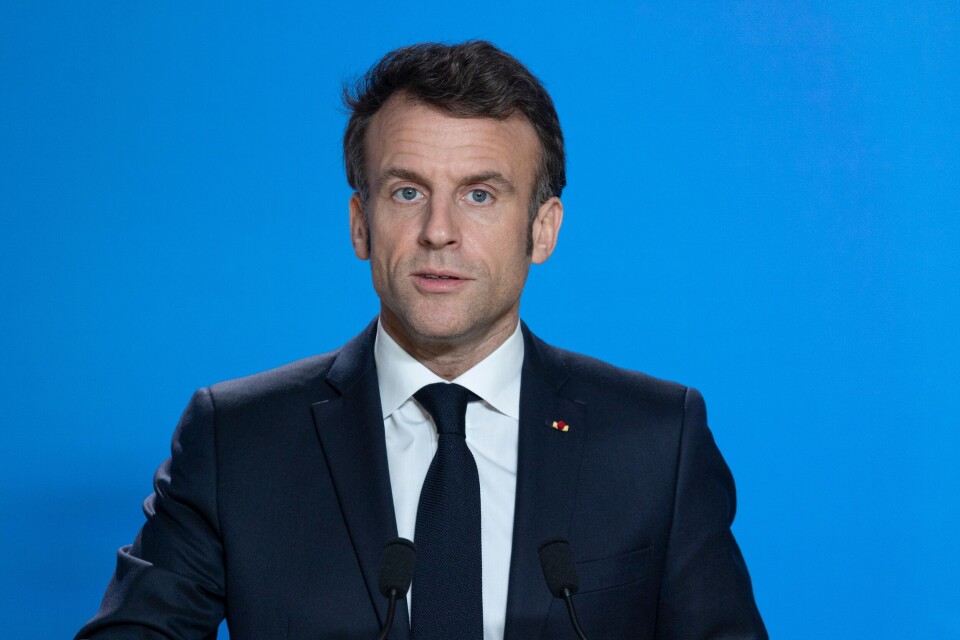-
Scam calls in France more than double in a year
Complaints about unsolicited calls are second only to those about fibre optic internet
-
‘Medical deserts’ major issue in upcoming local elections in France
Access to healthcare is now a more pressing concern than education, mayors say
-
‘Digital ID’ to be accepted at French airports this summer
Users of the France Identité app will be able to board certain flights using ID on smartphone
Five key takeaways from Macron’s televised speech to the nation
In an apparent bid to move on from the pensions reforms crisis, France’s president pledged to focus on better hospitals and law and order

France’s president Emmanuel Macron addressed the nation from the Élysée Palace on Monday (April 17) evening in his first speech since the passing of the controversial pension reform bill.
The president adopted a reconciliatory tone, admitting there had been anger over the reforms, which most notably will see the minimum retirement age rise from 62 to 64.
Three new projects were outlined that the government will focus on in the coming months -in the realms of justice, healthcare, and greater levels of participatory governance - alongside further talks over working conditions in France.
Here are the five key points discussed by the president in the address.
Turning a new page after controversial pension reforms?
Mr Macron wants to quickly move on from the pension reform bill and dedicated much of the speech to other issues facing the country.
He again reiterated that he believes the reforms are necessary to help France combat the expected deficit in the pension funds.
The president conceded the reforms had “obviously not been accepted” by everyone in France, but that the anger was directed towards work that “no longer allows a good living in the face of rising prices [of food, petrol, etc]”.
Read more: France's pension reforms largely approved as referendum rejected
A new pact for working life
He reaffirmed his call for unions to meet with him at the Élysée on Tuesday (April 18) and said the “door will always be open” for discussions on work conditions.
In the coming weeks, Mr Macron wants to create “a new pact for working life” with the help of the unions, although it is unclear whether all of the key players will agree to sit at the table with the government.
Discussions will surround “essential subjects” of working life “without any limits or taboos,” and talks are expected to revolve around wage increases, working conditions, wealth redistribution, employment of senior citizens, and retraining programmes.
Fighting ‘delinquency’
One of Mr Macron’s new projects is centred around strengthening law and order.
Over 10,000 new magistrates will be hired and the speech confirmed plans by the Interior Minister Gérald Darmanin in February to recruit 200 extra gendarmerie brigades.
This increased focus on order will combat “all forms of delinquency, all types of social and fiscal fraud”, starting from the beginning of May.
Although another controversial bill – this time on immigration – is on hold, the president wants to strengthen France’s “control of illegal immigration”, whilst at the same time “better integrating those who [come to France legally]”.
Read more: Updated: Dates and sectors of upcoming pension strikes in France
Tackle public hospital crisis
The speech reaffirmed a will to improve the situation in France’s public hospitals, where a chronic shortage of doctors and rural ‘medical deserts’ leave patients short of vital care.
“By the end of next year, we must have relieved the congestion in all our emergency services,” the president said.
Mr Macron pointed towards his government’s record on healthcare during his second term.
“By the end of this year, 600,000 chronically ill patients who do not have a regular doctor will have one," he added.
Building new coalitions and alliances
Finally, a call to increase participation in governing the country. Mr Macron wants a coalition of “elected representatives, political forces, trade unions and all the components of the nation” to work together.
From May onwards, the government will look to include more institutions in the decision-making process, and Mr Macron highlighted the example of the citizens’ convention on euthanasia.
It will use the National Council for Refoundation, which Mr Macron launched in 2022, as its foundation, but it is unclear how this will work in principle.
Read more: French minister wants eco group disbanded over reservoir violence
What was the response?
The speech did seemingly little to convince those already against the president.
Jean-Luc Mélénchon, leader of the left-wing La France Insoumise party, said the president was “completely outside of reality” with the contents of the speech.
La France Insoumise MP Alexis Corbière posted a video of the inhabitants of Montreuil, Seine-Saint-Denis, protesting Macron’s speech by banging pots and pans at the time of the address.
En réponse à l'allocution présidentielle, à #Montreuil des habitants tapent sur des casseroles en scandant "Macron démission" ou "on ira jusqu'au retarite" #Macron20h pic.twitter.com/VPewOYIqRM
— Alexis Corbière (@alexiscorbiere) April 17, 2023
“Nothing really new, nothing concrete in a catalogue of pious wishes,” said Eric Ciotti, the leader of France’s right-wing Les Républicains party after the address.
Marine Le Pen, leader of the far-right Rassemblement National party said the president had “turned his back on the French people” and continues to “ignore their suffering”.
Related articles
What is France’s Constitutional Council and why is it in the news?
























